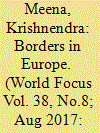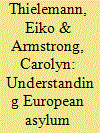| Srl | Item |
| 1 |
ID:
154066


|
|
|
|
|
| Summary/Abstract |
Since World War II, Europe has seen dramatic transformation of its borders. It has covered the full circle from the hard notions of territorial sovereignty enshrined in the Treaty of Westphalia to the Schengen Agreement wherein Europe allows free movement of goods, services, people and capital within the European Economic Area. The article looks at the changing borders in the European Union and their impact on the immediate neighbourhood of Europe.
|
|
|
|
|
|
|
|
|
|
|
|
|
|
|
|
| 2 |
ID:
172771


|
|
|
|
|
| Summary/Abstract |
In many European countries established leftwing and rightwing parties have been threatened by policy convergence and, in turn, new populist parties that offer more polarized platforms. I investigate whether government ideology influences dragnet-controls – controls of persons conducted by the police without having any suspicion that the controlled person committed a crime. They took effect after the Schengen Agreement in 1995. I propose dragnet-controls to be a prime example of ideology-induced policies implemented by established parties. Dragnet-controls confine citizens’ liberties, but may help to detect criminals. Using data from the 16 German states over the period 1995–2017, I show that rightwing governments have been active in implementing dragnet-controls and leftwing governments have denied dragnet-controls since the mid 1990s. When evaluating how government/party ideology influences individual policies, previous econometric studies ignored initiatives in parliament. My study also considers initiatives in parliament. I conjecture that, since 2015, the rightwing CDU has used initiatives to introduce/extend dragnet-controls to also deal with the upcoming threat of rightwing populism. Future research should examine policy-differences between the established parties regarding more fine-grained policy measures also in other European countries.
|
|
|
|
|
|
|
|
|
|
|
|
|
|
|
|
| 3 |
ID:
120831


|
|
|
|
|
| Publication |
2013.
|
| Summary/Abstract |
Recent developments in European Union (EU) asylum cooperation raise important questions about the nature of cooperation and the potential problems facing collective action in the realm of EU internal security. The emergence and the subsequent stability of the Schengen/Dublin system is especially puzzling, given the highly inequitable distribution of costs and benefits that this system entails among the participating states and begs the question as to why those states that are likely to face a disproportionate 'burden' under the system would have agreed to it. This article seeks to provide an alternative approach to answering this question by drawing on a public goods framework. We argue that a simple focus on free-riding and exploitation dynamics, as emphasized in the traditional collective action literature, falls short as an explanation and instead demonstrates how more recent theoretical contributions to the public goods literature can offer new insights into the origin and evolution in cooperation in this sensitive policy area.
|
|
|
|
|
|
|
|
|
|
|
|
|
|
|
|